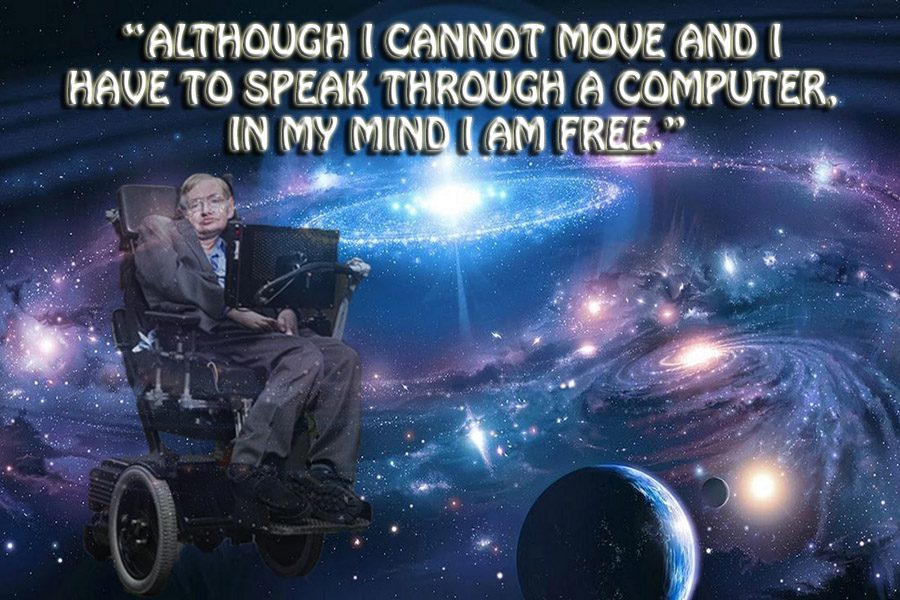The Legend: Stephen Hawking
During the early hours of Wednesday, March 14, 2018, self made theoretical physicist, Stephen Hawking passed away in his Cambridge home.
Hawking was a man of many talents who not only defied the stereotypes that come with having a disability, but also defying the laws of nature.
At the age of 21, Stephen Hawking was diagnosed with amyotrophic lateral sclerosis better known as “ALS”. ALS is a nervous system disease that weakens muscles and impairs movement. It is very rare, with only 20,000 cases per year. A large number of those who are diagnosed only live anywhere from a few months to a couple of years before the disease causes their organs to fails. When Hawking was first diagnosed, the doctors said he only had two years left to live. Despite what the doctors said and the 10% chance of living through another decade, Stephen Hawking defied all odds. He lived a total of 55 years with ALS and nobody, not even professionals, can figure out why.
Not only was Hawking a medical rarity, but he was also a modern day genius who published his own ideas frequently. He was so smart and open minded that he was commonly referred to as this generation’s Albert Einstein due to his success in cosmology, the science of the origin and development of the universe.
Stephen Hawking once said, “There is no unique picture of reality”, which is the same basis Hawking used for all of his research. He never let the ideas of others affect his own, and he always thought outside the box. He refused to conform his ideas to those that might have seemed more “realistic”: he believed in the impossible.
Hawking authored and co-authored many works of fiction that were based on his own beliefs. Some of his most popular books include: A Brief History of Time, The Universe in a Nutshell, and On the Shoulders of Giants. He co-authored The Nature of Space and Time with Roger Penrose, The Grand Design with Leonard Mlodinow, and The Large, the Small and the Human Mind with Roger Penrose, Abner Shimony, and Nancy Cartwright.
There were even multiple films based on him and his work. For example, A Brief History of Time (1992), Stephen Hawking’s Universe (2004), Stephen Hawking and the Theory of Everything (2007), and Into the Universe with Stephen Hawking (2010).
One of Hawking’s first and most well known theories was not his own, but an expanded version of the original Big Bang Theory. With help from Roger Penrose in 1970, Hawking and Penrose reviewed the theory and concluded that instead of space being an expansion of tiny spec, it was instead created from the collapse of a black hole in reverse. Their new theory meant that the universe started out as a singularity, as stated in Hawkings and Penrose’s paper titled, The Singularities of Gravitational Collapse and Cosmology.
In 1974, Hawking was elected a Fellow of the Royal Society. He was also a lifetime member of the Pontifical Academy of Sciences. In 2009, Obama awarded him with the Presidential Medal of Freedom, which is the highest civilian award. In 2015, he received the BBVA Foundation Frontiers of Knowledge Award in Basic Sciences, shared with Viatcheslav Mukhanov for discovering that the galaxies were formed from quantum fluctuations in the early universe. During the 2016 Pride of Britain Awards, Hawking received the lifetime achievement award for his contribution to science and British culture.
Not only did Hawking receive several awards, but he also handed them out. In 2015, Hawking had an award named after him. The Stephen Hawking Medal for Science Communication Award, which is awarded to three different winners every year, one from each of the scientific, artistic, and film communities. In June 2016, Hawking handed out the very first award for scientific community at the Starmus Festival.
As told by all of the preceding achievements, Hawkings had many admirers from both the science and public community. During the early hours of March 14, when news first broke out about his death, thousands, if not millions, took to social media to honor the legend known as Stephen Hawkings, the smartest man in the world. A majority of those posts praised him for being strong enough to battle an incurable disease and still become all that he did. The tributes were all heartfelt and filled with emotion, but there were a select few that expanded on the fact that Stephen Hawking was a rarity in the universe, which we already knew. Stephen Hawking was born on the 300th anniversary of Galileo’s death. Galileo was a famous astronomer from Italy and not only was Hawking born on the passing date of Galileo’s untimely passing, but he passed away on Albert Einstein’s birthday, which is also known as Pi Day. This only proves that time is relative and the universe works in amazing ways.
All in all, Stephen Hawking was a legend whose name will forever be remembered. As stated in one of his most famous quotes, “Remember to look up at the stars and not down at your feet. Try to make sense of what you see and wonder about what makes the universe exist. Be curious. And however difficult life may seem, there is always something you can do and succeed at. It matters that you don’t just give up.” Hawking was a true rarity who stood for countless things. Just as he encouraged many while he was alive, let him continue to encourage you even after his death. Remember to shoot for the stars.

Hey! My name is Sharia Williamson. I am a seventeen year old student here at Alliance High School, and the senior editor, for the SPUD.
After I graduate...











